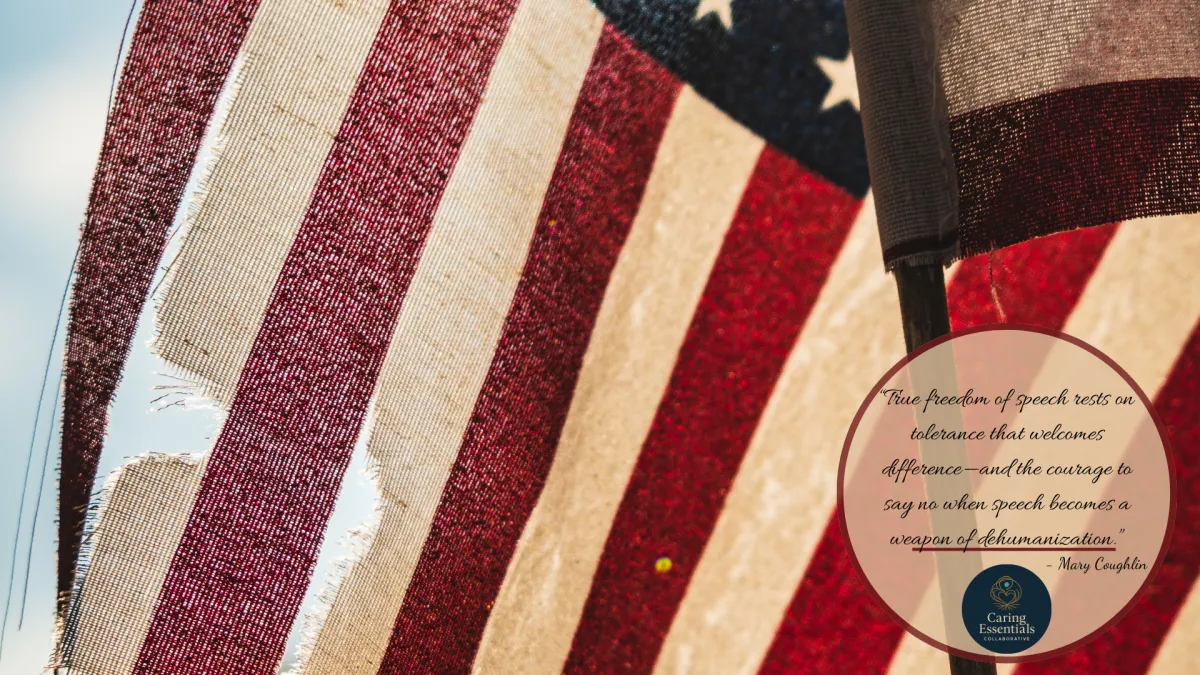
Freedom of Speech vs. Freedom of Hate: Why Tolerance Matters
“True freedom of speech rests on tolerance that welcomes difference—and the courage to say no when speech becomes a weapon of dehumanization.” - Mary Coughlin
Freedom of Speech vs. Freedom of Hate: Why Tolerance Matters
Freedom of speech is often celebrated as one of democracy’s most sacred rights. It is the foundation of civic life, the mechanism through which ideas are tested, leaders are held accountable, and diverse voices are heard. Without it, truth withers, and power grows unchecked.
But too often, the conversation gets distorted. People claim the mantle of “free speech” not to exchange ideas, but to justify harm. Words are wielded like weapons—not to persuade or enlighten, but to degrade, intimidate, and silence.
This is where we must pause. Freedom of speech is not the same as freedom of hate.
The Role of Tolerance
To truly have freedom of speech, tolerance is required. A democracy cannot thrive if only some voices are permitted while others are shut out. Tolerance creates the space where disagreement, critique, and even discomfort can be held without fear of repression.
But tolerance is not without limits. Philosopher Karl Popper captured this tension in his “paradox of tolerance”:
“Unlimited tolerance must lead to the disappearance of tolerance. If we extend unlimited tolerance even to those who are intolerant… then the tolerant will be destroyed, and tolerance with them.”
In other words, if tolerance is extended even to those who use speech to destroy dialogue and dehumanize others, freedom of speech itself collapses. Tolerance must be both a ground and a guardrail—a ground that nurtures diverse voices, and a guardrail that protects against speech that corrodes safety, dignity, and belonging.
A Living Case Study: The Kimmel Controversy
These questions aren’t just theoretical. They are playing out in real time. Recently, Jimmy Kimmel Live! was suspended after remarks Kimmel made about conservative activist Charlie Kirk. What made this suspension more than a network decision was the pressure from the Federal Communications Commission, whose chair threatened ABC’s parent company with regulatory consequences over Kimmel’s comments.
For many, this looked less like a concern for the “public interest” and more like an attempt to silence criticism of the current administration. Media observers and free-speech advocates quickly warned of the chilling effect: when government power is used to punish political commentary, it is no longer about upholding standards but about stifling dissent.
At the same time, it’s important to recognize the complexity. Broadcast networks do have obligations under law, and the government has historically regulated speech on public airwaves. But when enforcement becomes selective—targeting speech critical of those in power—the balance tips from regulation to repression.
This is exactly where Karl Popper’s paradox of tolerance becomes so relevant. A democracy must tolerate a wide range of voices, including satire and critique, or else speech rights collapse into privileges only for those in favor with the powerful. Tolerance is the ground of democracy. But if those in power claim the right to define what speech counts as “harmful” or “misleading” whenever it challenges them, tolerance itself begins to disappear.
From a trauma-informed perspective, this moment highlights the stakes: when dissent is silenced, fear grows. When voices are chilled, belonging shrinks. And when the powerful weaponize speech rules, the very conditions for democracy are eroded.
A Trauma-Informed Lens
From a trauma-informed perspective, the stakes are even clearer. Words are not neutral. They carry weight in the nervous system. They can soothe, or they can scar. For communities already carrying the burden of trauma, hate speech does not just “offend”—it retraumatizes, silences, and shuts down participation.
If we confuse freedom of speech with freedom of hate, we risk creating an environment where only the loudest and most harmful voices thrive, while others are pushed into silence. That is not democracy. That is domination.
Reflections for Us All
Where do I see the difference between speech that challenges me and speech that dehumanizes me—or others?
How do I balance the right to express myself with the responsibility to care for the impact of my words?
What does it mean for me, in this moment, to choose speech that expands safety, dignity, and belonging?
Freedom of speech is a gift worth protecting. But let us be clear: freedom of speech depends on tolerance, not on hate. True freedom requires us to hold space for difference while setting limits that preserve safety, dignity, and our shared humanity.
For freedom and belonging,
Mary
